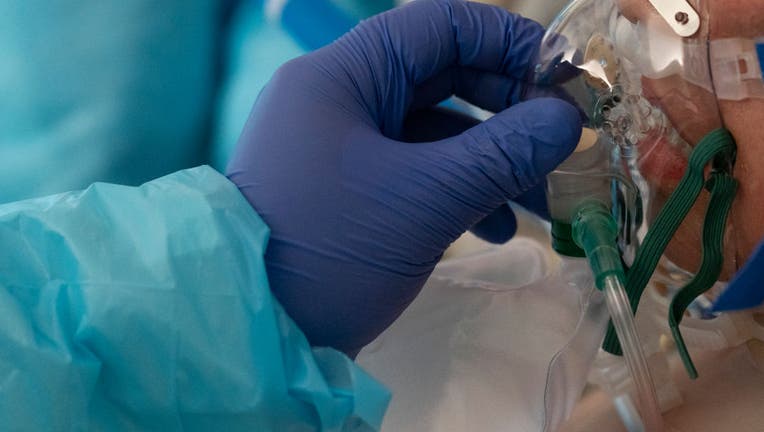Greek nurse builds ICU at home to treat relatives with COVID-19

A medical staff member holds an oxygen mask for a patient in the COVID-19 intensive care unit (ICU) at the United Memorial Medical Center on Dec. 21, 2020 in Houston, Texas. (Photo by Go Nakamura/Getty Images)
AGIOS ATHANASIOS, Greece - What does a medical professional do when his wife and in-laws contract the disease at the center of a months-long pandemic?
Gabriel Tachtatzoglou, a critical care nurse, did not feel good about the treatment options available in Greece's second-largest city when his wife, both her parents and her brother came down with COVID-19 in November. Thessaloniki has been among the areas of Greece with the most confirmed coronavirus cases, and hospital intensive care units were filling up.
Tachtatzoglou, who had to quarantine and could not go to work once his relatives tested positive for the virus, decided to put his ICU experience to use by looking after them himself.
That decision, his family says, probably saved their lives.
RELATED: Try this on for size: College student creates her own 12-foot social distancing dress
"If we had gone to the hospital, I don’t know where we would have ended up," Polychoni Stergiou, the nurse's 64-year-old mother-in-law, said. "That didn’t happen, thanks to my son-in-law."
Tachtatzoglou set up a makeshift ICU in the downstairs apartment of his family's two-story home in the village of Agios Athanasios, located about 30 kilometers (nearly 20 miles) from the city. He rented, borrowed and modified the monitors, oxygen delivery machines and other equipment his loved ones might need.
He also improvised. Out of a hat stand, he fashioned an IV bag holder. At one point, the repurposed pole supported four bags dispensing antibiotics, fluids to address dehydration and fever-reducing medicine.
"I’ve been working in the intensive care ward for 20 years, and I didn’t want to put my in-laws through the psychological strain of separation. Plus, there was already a lot of pressure on the health service," Tachtatzoglou told the AP in an interview.
In most countries, doctors and nurses are discouraged from treating close relatives and friends on the theory that emotional bonds could cloud their judgment and affect their skills. Tachtatzoglou says he remained in daily contact with doctors at Papageorgiou Hospital, the overwhelmed facility where he works, while caring for his sick family members, and that he would have hospitalized any of the four if they needed to be intubated.
RELATED: 'Patients are dying like flies': Nurse in ICU begs the public to stop being careless
"I looked after them up until the point where it would pose no danger," he said. "At all times, I was ready to move them to the hospital, if needed."
Greece, which has a population of 10.7 million, spent the first phase of the coronavirus pandemic with some of the lowest infection rates in Europe. As cold weather set in, the number of confirmed cases and virus-related deaths began doubling. The country's cumulative death toll in the pandemic went from 393 on Oct. 1 and 635 a month later to 2,517 on Dec.1. As of Tuesday, it stood at 4,730.
With ICU wards in Thessaloniki pushed to capacity, COVID-19 patients deemed too sick to a wait for a bed were taken to hospitals in other parts of Greece, riding in torpedo-shaped treatment capsules. Meanwhile, the situation for Tachtatzoglou’s family deteriorated as his wife and in-laws fell ill in alarming succession.
Tachtatzoglou said he agonized constantly over whether to transfer his relatives to hospitals in Thessaloniki, knowing it would mean they would not be able to see each other and might get moved to a hospitals farther away.
RELATED: President-elect Biden: Wearing a mask is patriotic, not political
"We were reduced to tears. There were times when I was desperate, and I was really afraid I would lose them," the nurse said.
They all pulled through, although Tachtatzoglou eventually became infected with the virus himself.
"I took precautions when I treated them, but I didn’t have the personal protection gear you find in hospitals," he said. "That’s probably how I got sick."

